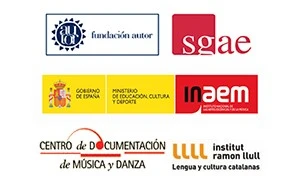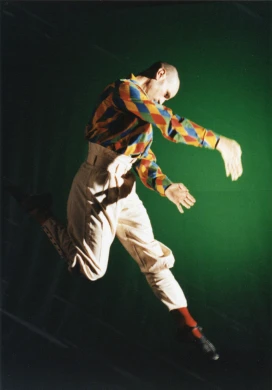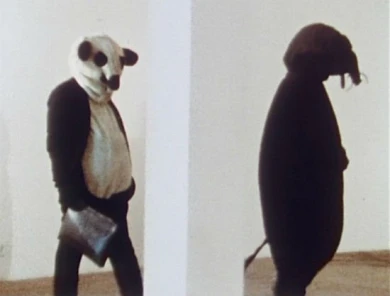-
October 25, 2013 Nouvel Building, Auditorium 200
New agents/new institutions
Debate in which various managers with important roles during that time will analyse institutional development: different methods used in the management and exhibition of the new national and international trends in contemporary dance in Spain.
Moderated by: Beatriz Martínez del Fresno
Participants: Manuel Llanes, Guillermo Heras, Beatriu Daniel and Toni Pastor
Manuel LLanes. Founder, programming director and general director, successively, of the International Theatre Festival of Granada, over a period of 16 years. This Festival specialises in contemporary theatre and dance. Currently the artistic director of Espacios Escénicos, an initiative of the Department of Culture of the Regional Government of Andalucía (at Teatro Central in Seville, Teatro Alhambra in Granada and Teatro Cánovas in Málaga).Guillermo Heras. Director of Centro Nacional de Nuevas Tendencias Escénicas (1983-1993), which was founded as a platform for exhibiting and producing contemporary dance in Spain. Currently the director of the Muestra de Teatro Español de Autores Contemporáneos and executive secretary of the technical unit at Iberescena.
Beatriu Daniel. Cultural manager specialised in dance. Member of the generation that in the 80s did a great deal to advance contemporary dance in Cataluña, as the co-director of the magazine DANSA-79 and director, from 2005 to 2011 of “Centre de creació de dansa i arts escèniques.”
Toni Pastor. Cultural manager for the past 30 years, working for different private enterprises and also public bodies. Through the Generalitat Valenciana, in 1987, he created the Circuito Teatral Valenciano and the contemporary dance festival “Dansa València” in 1988, which he also directed for the first five years. -
October 26, 2013 Nouvel Building, Auditorium 200
Creation: tendencies and geographies
Round table on the creative effervescence of contemporary dance in the 80s in Spain. Several of the main creators active during those years will discuss the diversity of the languages so characteristic of that period in this country.
Moderated by: Isabel de Naverán
Participants: Angels Margarit, Bocanada Danza (La Ribot and Blanca Calvo), Rosángeles Valls and Antonia Andreu
Angels Margarit. Angels Margarit / Company. MUDANCES began its activity in 1985, taking its name from its first show, MUDANCES. In 2010 Angels Margarit was awarded the National Dance Prize, creation modality, by the Ministry of Culture.
La Ribot and Blanca Calvo. Choreographers and dancers, had the idea in the 80s of founding Bocanada Danza (1986 – 1989), thus creating a young platform for experimentation, one of a kind at that time in Madrid. Afterwards they worked separately: La Ribot began her internationally recognised work with the series "Piezas Distinguidas", which had a major influence on the new conception of contemporary dance. Blanca Calvo would collaborate with the Basque choreographer Ion Munduate in various pieces, and together they undertook the project Mugatxoan, which focused on emerging practices and projects located between choreography and the visual arts. In 1997 La Ribot and Blanca Calvo worked together again, when they organised Desviaciones 1997- 2001, with José A. Sánchez. This project consisted of a series of presentations, debates and lectures of what now might be called “expanded choreography.” Many of the artists and intellectuals who later marked the new currents in international contemporary dance during the following decade were involved in this initiative.
Rosángeles Valls founded Ananda (a Sanskrit work meaning "be happy in all that you do") in 1981 in Valencia. Since then, over 18 shows and numerous prizes and other types of recognition have dotted her long career.
Antonia Andreu. Dancer and choreographer. In 1980 she traveled to New York and studied with Merce Cunningham at the latter’s Professional Training Program. During her time in the city she learned about and took part in the work of other choreographers of post-modern dance, such as Douglas Dunn, Thrisha Brown and Lucinda Childs. In 1986 she returned to Spain and founded her own company.

Held on 25, 26 Oct 2013
In parallel with the presentation of the new section of the Collection: Minimal Resistance. Between late modernism and Globalisation a seminar is to be held, entitled Dance in the 80s: the first steps of contemporary dance in Spain. It includes two round tables, lectures and the display of archival materials in the Collection’s interpretation areas.
It offers a space in which to reflect on a key period in the development of this discipline in Spain.
Context
Once Spain’s transition to democracy was complete, an important new stage began in the configuration of the contemporary culture system and, particularly, that of dance. In the words of the art historian José Antonio Sánchez “the decade of the 1980s was understood as a normalising process”. New exhibition venues appeared, contemporary creation was promoted, in 1980 it became possible to study contemporary dance in a public institution (Institut del Teatre, Barcelona) and in 1985 the National Institute of Performing Arts and Music was founded.
As these new languages took shape, the appearance of festivals, exhibitions and theatres was decisive, since they enabled creators to see international productions and present their own work through new structures such as “Dansa València” (Valencia), Centro Nacional de Nuevas Tendencias Escénicas (Madrid), and Mercat de les Flors (Barcelona), among others.
To explore this period of great creative effervescence, two round tables have been organised. One about institutional development – the different modes of managing and exhibiting the new trends – and another about choreographic creation, which during this decade was very much a melting pot of different languages and forms of experimentation.
Organised by
Museo Reina Sofía
In collaboration with

Más actividades
![Tracey Rose, The Black Sun Black Star and Moon [La luna estrella negro y negro sol], 2014.](https://recursos.museoreinasofia.es/styles/small_landscape/public/Obra/AD07091_2.jpg.webp)
On Black Study: Towards a Black Poethics of Contamination
Monday 27, Tuesday 28 and Wednesday 29 of April, 2026 – 16:00 h
The seminar On Black Study: Towards a Black Poethics of Contamination proposes Black Study as a critical and methodological practice that has emerged in and against racial capitalism, colonial modernity and institutional capture. Framed through what the invited researcher and practitioner Ishy Pryce-Parchment terms a Black poethics of contamination, the seminar considers what it might mean to think Blackness (and therefore Black Study) as contagious, diffuse and spreadable matter. To do so, it enacts a constellation of diasporic methodologies and black aesthetic practices that harbor “contamination” -ideas that travel through texts, geographies, bodies and histories- as a method and as a condition.
If Blackness enters Western modernity from the position of the Middle Passage and its afterlives, it also names a condition from which alternative modes of being, knowing and relating are continually forged. From within this errant boundarylessness, Black creative-intellectual practice unfolds as what might be called a history of touches: transmissions, residues and socialities that unsettle the fantasy of pure or self-contained knowledge.
Situated within Black radical aesthetics, Black feminist theory and diasporic poetics, the seminar traces a genealogy of Black Study not as an object of analysis but as methodological propositions that continue to shape contemporary aesthetic and political life. Against mastery as the horizon of study, the group shifts attention from what we know to how we know. It foregrounds creative Black methodological practices—fahima ife’s anindex (via Fred Moten), Katherine McKittrick’s expansive use of the footnote, citation as relational and loving labour, the aesthetics of Black miscellanea, and Christina Sharpe’s practices of annotation—as procedures that disorganise dominant regimes of knowledge. In this sense, Black Study is approached not as a discrete academic field but as a feel for knowing and knowledge: a constellation of insurgent practices—reading, gathering, listening, annotating, refusing, world-making—that operate both within and beyond the university.
The study sessions propose to experiment with form in order to embrace how ‘black people have always used interdisciplinary methodologies to explain, explore, and story the world.’ Through engagements with thinkers and practitioners such as Katherine McKittrick, C.L.R. James, Sylvia Wynter, Christina Sharpe, Fred Moten, Tina Campt, Hilton Als, John Akomfrah, fahima ife and Dionne Brand, we ask: What might it mean to study together, incompletely and without recourse to individuation? How might aesthetic practice function as a poethical intervention in the ongoing work of what Sylvia Wynter calls the practice of doing humanness?

Intergenerationality
Thursday, 9 April 2026 – 5:30pm
This series is organised by equipoMotor, a group of teenagers, young people and older people who have participated in the Museo Reina Sofía’s previous community education projects, and is structured around four themed blocks that pivot on the monstrous.
The third session gazes at film as a place from which to dismantle the idea of one sole history and one sole time. From a decolonial and queer perspective, it explores films which break the straight line of past-present-future, which mix memories, slow progress and leave space for rhythms which customarily make no room for official accounts. Here the images open cracks through which bodies, voices and affects appear, disrupting archive and questioning who narrates, and from where and for whom. The proposal is at once simple and ambitious: use film to imagine other modes of remembering, belonging and projecting futures we have not yet been able to live.

Remedios Zafra
Thursday March 19, 2026 - 19:00 h
The José Luis Brea Chair, dedicated to reflecting on the image and the epistemology of visuality in contemporary culture, opens its program with an inaugural lecture by essayist and thinker Remedios Zafra.
“That the contemporary antifeminist upsurge is constructed as an anti-intellectual drive is no coincidence; the two feed into one another. To advance a reactionary discourse that defends inequality, it is necessary to challenge gender studies and gender-equality policies, but also to devalue the very foundations of knowledge in which these have been most intensely developed over recent decades—while also undermining their institutional support: universities, art and research centers, and academic culture.
Feminism has been deeply linked to the affirmation of the most committed humanist thought. Periods of enlightenment and moments of transition toward more just social forms—sustained by education—have been when feminist demands have emerged most strongly. Awareness and achievements in equality increase when education plays a leading social role; thus, devaluing intellectual work also contributes to harming feminism, and vice versa, insofar as the bond between knowledge and feminism is not only conceptual and historical, but also intimate and political.
Today, antifeminism is used globally as the symbolic adhesive of far-right movements, in parallel with the devaluation of forms of knowledge emerging from the university and from science—mistreated by hoaxes and disinformation on social networks and through the spectacularization of life mediated by screens. These are consequences bound up with the primacy of a scopic value that for some time has been denigrating thought and positioning what is most seen as what is most valuable within the normalized mediation of technology. This inertia coexists with techno-libertarian proclamations that reactivate a patriarchy that uses the resentment of many men as a seductive and cohesive force to preserve and inflame privileges in the new world as techno-scenario.
This lecture will address this epochal context, delving into the synchronicity of these upsurges through an additional parallel between forms of patriarchal domination and techno-labor domination. A parallel in which feminism and intellectual work are both being harmed, while also sending signals that in both lie emancipatory responses to today’s reactionary turns and the neutralization of critique. This consonance would also speak to how the perverse patriarchal basis that turns women into sustainers of their own subordination finds its equivalent in the encouraged self-exploitation of cultural workers; in the legitimation of affective capital and symbolic capital as sufficient forms of payment; in the blurring of boundaries between life and work and in domestic isolation; or in the pressure to please and comply as an extended patriarchal form—today linked to the feigned enthusiasm of precarious workers, but also to technological adulation. In response to possible resistance and intellectual action, patriarchy has associated feminists with a future foretold as unhappy for them, equating “thought and consciousness” with unhappiness—where these have in fact been (and continue to be) levers of autonomy and emancipation.”
— Remedios Zafra

ARCO2045. The Future, for Now
Saturday 7, March 2026 - 9:30pm
The future, its unstable and subjective nature, and its possible scenarios are the conceptual focus of ARCOmadrid 2026. A vision of the future linked to recent memory, a flash of insight into a double-edged sword. This year's edition, as in the previous two, will once again hold its closing party at the Reina Sofia Museum. This time, the star of the show is Carles Congost (Olot, Girona, 1970), one of the artists featured in the new presentation of the Collections recently inaugurated on the 4th floor of the Sabatini Building.
Carles Congost, with his ironic and timeless gaze, is responsible for setting the tone for this imperfect future, with a DJ session accompanied by some of his works in the Cloister on the first floor of the Sabatini Building of the Museo on the night of Saturday 7 March.

27th Contemporary Art Conservation Conference
Wednesday, 4, and Thursday, 5 March 2026
The 27th Contemporary Art Conservation Conference, organised by the Museo Reina Sofía’s Department of Conservation and Restoration, with the sponsorship of the Mapfre Foundation, is held on 4 and 5 March 2026. This international encounter sets out to share and debate experience and research, open new channels of study and reflect on conservation and the professional practice of restorers.
This edition will be held with in-person and online attendance formats, occurring simultaneously, via twenty-minute interventions followed by a five-minute Q&A.

